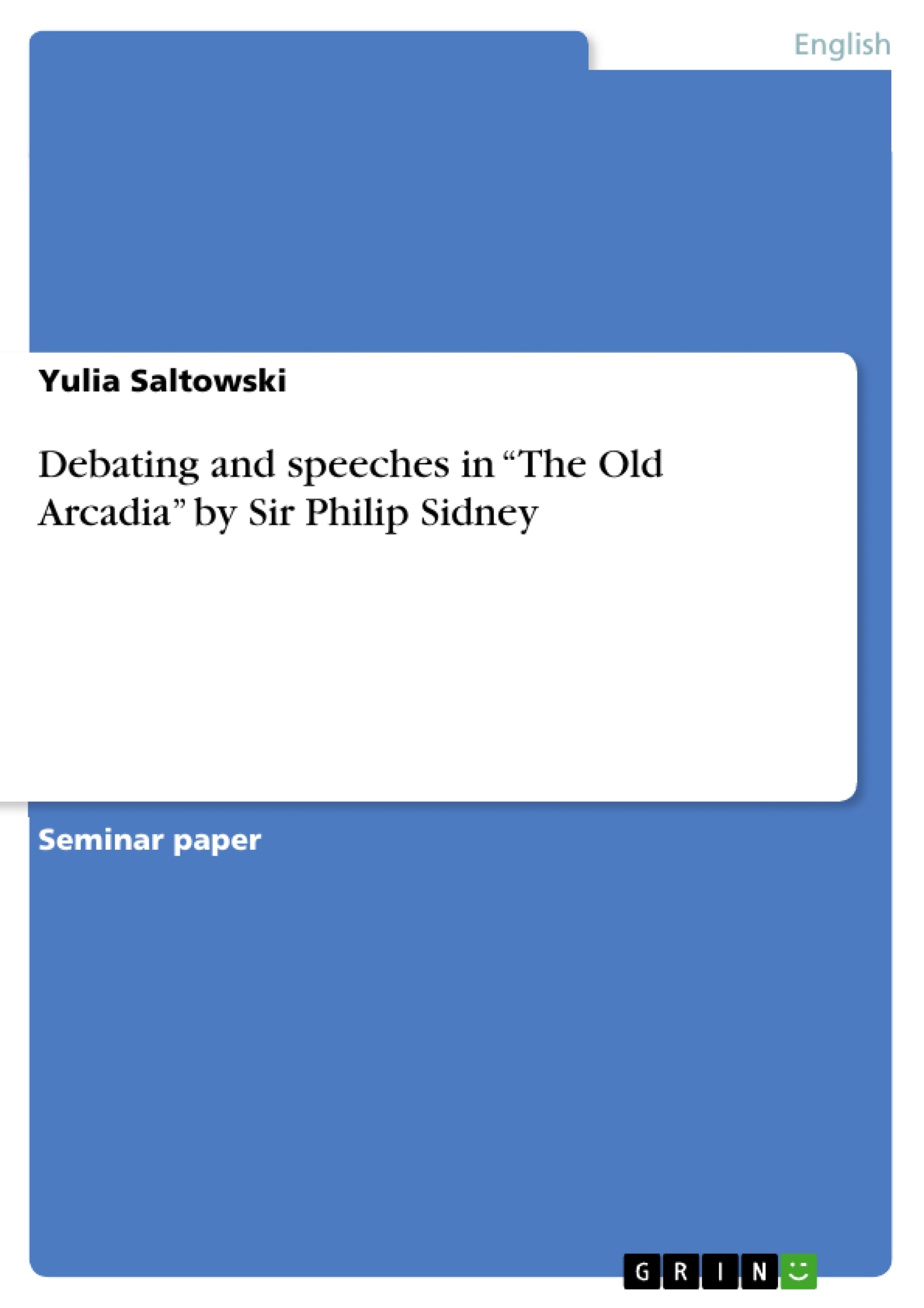Therefore, the aim of our work is to find out what structure the speech of a medieval courtier looks like, and by what rhetoric principles it is built. We will investigate this question not only from the theoretical point of view, but also on the example of “The Old Arcadia”’s speeches. We will also analyze Arcadian speeches from the angle of its lexical, stylistic, and syntactic value.
Inhaltsverzeichnis (Table of Contents)
- INTRODUCTION
- NOTIONS “DEBATING” AND “DISCUSSION”
- DEBATING AND DISCUSSION IN “THE OLD ARCADIA”
- STRUCTURE OF A SPEECH IN “THE OLD ARCADIA”
- THE MAIN CHARACTERISTICS OF SPEECHES IN “THE OLD ARCADIA”
- THE THEME OF LOVE AND JUSTICE IN THE ARCADIAN DEBATING
- CONCLUSION
- BIBLIOGRAPHY
Zielsetzung und Themenschwerpunkte (Objectives and Key Themes)
This work aims to analyze the structure and rhetoric principles of speeches within Sir Philip Sidney's "The Old Arcadia," exploring its significance in the context of Elizabethan communication. The study investigates how these speeches reflect the range of themes prevalent in the Elizabethan era.
- The structure and rhetoric principles of speeches in "The Old Arcadia."
- The significance of debating in "The Old Arcadia" as a reflection of Elizabethan communication.
- The role of rhetoric in shaping the speeches of the characters in "The Old Arcadia."
- The themes of love and justice as they are debated and discussed in "The Old Arcadia."
- The relationship between speech and character development in "The Old Arcadia."
Zusammenfassung der Kapitel (Chapter Summaries)
The introduction sets the stage for the analysis by outlining the significance of debating in "The Old Arcadia" as a reflection of both Elizabethan communication and the richness of Sidney's language. The chapter then explores the definitions of "debating" and "rhetoric," establishing the theoretical framework for the analysis of the work. The chapter explores the relationship between debating and rhetoric, examining the five canons of rhetoric, and providing the basis for the analysis of speeches within "The Old Arcadia."
The chapter then examines the structure of speeches in "The Old Arcadia," focusing on the canons of rhetoric, specifically disposition. It presents the typical structure of speeches, including an introduction, main part, and conclusion, and provides examples of speeches by Musidorus, Pyrocles, and Basilius, highlighting the use of epithets and other rhetorical devices.
Schlüsselwörter (Keywords)
This work focuses on the key concepts of debating, rhetoric, and Elizabethan communication. It delves into the structure of speeches, their characteristics, and the themes of love and justice as they are presented in "The Old Arcadia." Key terms include: rhetoric, disposition, inventio, elocutio, debating, discussion, speech, and the Elizabethan era.
Frequently Asked Questions
What is the main objective of the analysis of "The Old Arcadia"?
The study aims to investigate the structure and rhetoric principles of speeches in Sir Philip Sidney’s "The Old Arcadia" from a theoretical and lexical perspective.
How is a typical speech structured in Sidney's work?
Speeches generally follow a classical rhetorical structure consisting of an introduction, a main part, and a conclusion, reflecting the canon of disposition.
Which themes are predominantly debated in the book?
The speeches focus heavily on the themes of love and justice, which were central to Elizabethan courtly communication.
What rhetorical devices are analyzed in the speeches?
The analysis looks at epithets, syntactic values, and stylistic choices used by characters like Musidorus, Pyrocles, and Basilius.
What is the significance of "debating" in the Elizabethan era?
Debating reflects the richness of Sidney's language and serves as a mirror of the sophisticated communication styles prevalent in Elizabethan society.
- Quote paper
- Yulia Saltowski (Author), 2007, Debating and speeches in “The Old Arcadia” by Sir Philip Sidney , Munich, GRIN Verlag, https://www.grin.com/document/81969



